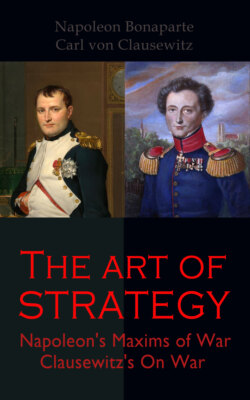Читать книгу The Art of Strategy: Napoleon's Maxims of War + Clausewitz's On War - Carl von Clausewitz - Страница 22
На сайте Литреса книга снята с продажи.
ОглавлениеMAXIM XVII.
Table of Contents
In a war of march and manœuvre, if you would avoid a battle with a superior army, it is necessary to entrench every night, and occupy a good defensive position. Those natural positions which are ordinarily met with, are not sufficient to protect an army against superior numbers without recourse to art.
NOTE.
The campaign of the French and Spanish army, commanded by the Duke of Berwick, against the Portuguese, in the year 1706, affords a good lesson on this subject. The two armies made almost the tour of Spain. They began the campaign near Badajoz, and after manœuvring across both Castiles, finished it in the kingdoms of Valencia and Murcia. The Duke of Berwick encamped his army eighty-five times, and although the campaign passed without a general action, he took about ten thousand prisoners from the enemy. Marshal Turenne also made a fine campaign of manœuvre against the Count Montécuculli, in 1675.
The imperial army having made its arrangements to pass the Rhine at Strasburg, Turenne used all diligence, and, throwing a bridge over the river near the village of Ottenheim, three leagues below Strasburg, he crossed with the French army, and encamped close to the little town of Vilstet, which he occupied. This position covered the bridge of Strasburg, so that, by this manœuvre, Turenne deprived the enemy of all approach to that city.
Upon this, Montécuculli made a movement with his whole army, threatening the bridge at Ottenheim, by which the French received their provisions from upper Alsace.
As soon as Turenne discovered the design of the enemy, he left a detachment at Vilstet, and made a rapid march with his whole force upon the village of Altenheim. This intermediate position between the two bridges, which he wished to preserve, gave him the advantage of being able to succor either of these posts before the enemy had time to carry them. Montécuculli seeing that any successful attack upon the bridges was not to be expected, resolved to pass the Rhine below Strasburg, and with this view returned to his first position at Offenburg. Marshal Turenne, who followed all the movements of the Austrian army, brought back his army also to Vilstet.
In the meantime, this attempt of the enemy having convinced the French general of the danger to which his bridge had exposed him, removed it nearer to that of Strasburg, in order to diminish the extent of ground he had to defend.
Montécuculli, having commanded the magistrates of Strasburg to collect materials for a bridge, moved to Scherzheim to receive them; but Turenne again defeated his projects by taking a position at Freistett, where he occupied the islands of the Rhine, and immediately constructed a stockade.
Thus it was that, during the whole of this campaign, Turenne succeeded in gaining the initiative of the enemy, and obliging him to follow his movements. He succeeded, also, by a rapid march, in cutting off Montécuculli from the Town of Offenburg, whence he drew his supplies, and would no doubt have prevented the Austrian general from effecting his junction with the corps of Caprara, had not a cannon-shot terminated this great man’s life.
